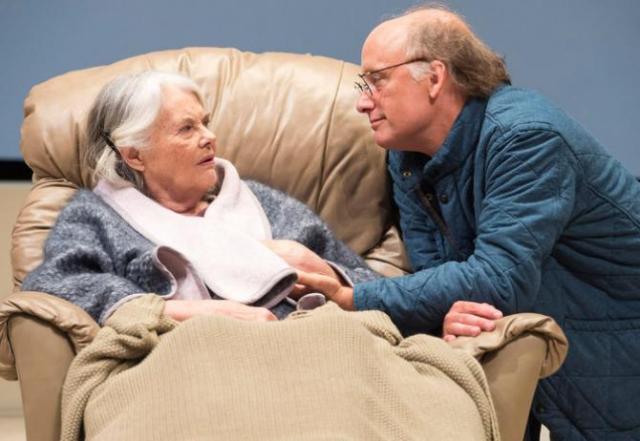
With the population aging – think baby boomers, as well as their parents and grandparents – Alzheimer, dementia, and loss of memory are among the hottest of hot-button topics around. (Well, if you push aside the daily barrage of updates on Ebola, ISIS, terrorism, as well as older articles on the spread of AIDS, the two Gulf Wars and 9/11.) Everybody that I speak with knows somebody suffering from Alzheimer’s or some sort of dementia. It seems to be an epidemic.
Since art follows life, there also appears to be an upsurge--not only in the media, but in film, theater and TV--on the various ways of leaving the planet with a large chunk, if not all, of your memory going, going, gone. Among the major movies featuring loss of memory as the locus is the extremely romantic love story with a shocking ending, “Amour,” which won an Oscar for Best Foreign Film in 2013, “Away From Her” (2006) based on a short story by Alice Munro starring Julie Christie–she was nominated for an Academy Award as best actress--and “The Notebook,” in which Gena Rowlands, playing an Alzheimer’s patent in a nursing home, has her memory intermittently rekindled by James Garner reading stories to her.
As far as loss of memory, topping the list in plays, as far as exposure, is Sharr White’s The Other Place, which opened Off Broadway in 2011 before moving to Broadway in 2012. Directed by Joe Mantello and starring Laurie Metcalf in both productions, White’s drama tells of a pharmaceutical-company scientist promoting a new drug she discovered for the treatment of dementia; the irony being she is slowly losing her own memory. Her highly touted performance garnered Metcalf an Obie Award, as well as a Tony nomination in 2013 for Best Performance by an Actress in a Leading role. Another play dealing with a similar subject is Jordan Harrison’s Marjorie Prime. Playing at the Mark Taper Forum in Los Angeles through October 19, it, too, deals with aging, death and the subject of memory, both its loss and reconstruction. With 83-year-old actress Lois Smith as its calling card (all of the reviewers tripped over their feet in canonizing her very appearance), Marjorie Prime is likely to make its way to New York City in the near future.
The play is both simple, complicated, and more than a mite confusing. The simple part is that Marjorie (Lois Smith), age 85 in the play and suffering from memory loss, is living in an assisted-living facility. Her visitors include her daughter Tess (Lisa Emery), son-in-law Jon (Frank Wood), and her husband Walter (Jeff Ward). The complexity, a taste of hi-tech with a dollop of sci-fi, is that her diseased husband Walter, played here by a much younger version of himself, is what the playwright term’s a Prime, a holographic projection whose very memory of his life with Marjorie is created by the information supplied by others, in Marjorie’s case, her daughter and son-in-law. The confusion is that the audience has no idea who the young man is much less that he is a “virtual” character, though a clue is dropped when the young Walter, responding to something Marjorie says, answers, “I’m afraid I don’t have that information.” As the play, somewhat predictably, unfolds, each of Harrison’s characters explores Marjorie’s degeneration, their own memories of Marjorie, as well as their attitudes towards aging and mortality. Tess examines her rocky relationship with her mother. Marjorie revisits her past with and Tess and Jon and with her husband Walter, who is initially introduced in an attempt to reverse Marjorie’s declining memory. His first, as he relates their past together, starts with “My Best Friend’s Wedding,” a movie that she does not remember that they saw together. And Jon, as the warmest, most understanding character in the play–beautifully inhabited by Wood, the only one to turn in a truly moving performance–attempts to hold everything together.
The movie “Her,” which the play echoes in part, tackles a similar concept to greater effect, as Joaquin Phoenix falls in love with a computer-generated voice (Scarlett Johansson), an artificial intelligence program whose intimate knowledge of him is supplied by any and all information available. Both the play and that movie take place in an undesignated future. Not unexpectedly, both the holographic husband, and the computer-generated voice have moments of wishing that they, too, were able to experience human emotions.
While Marjorie Prime introduces a number of interesting ideas and triggers a few (mostly) afterthoughts, the play itself – some 88 minutes without intermission – comes across more as an acting exercise, perhaps even a play reading, than an emotionally engaging experience. Ideas are put forth, the actors read their lines, and that’s about it.
This is not a reflection on director Les Waters who no doubt did the best he could with what he was given. There is only so much you can do with a play that is more concept than character-driven.
An aside: In reading the script, which I found a good deal more engaging than the production itself–perhaps because I had more time to weigh the themes and think–I noticed throughout that the playwright instructs the actors, Walter, Tess, and Marjorie, predominantly, to deliver their lines in a “faintly generic” manner, which might account for the confusion, among actors and audience alike, as to who is real and who is not, who is alive and who is dead.
